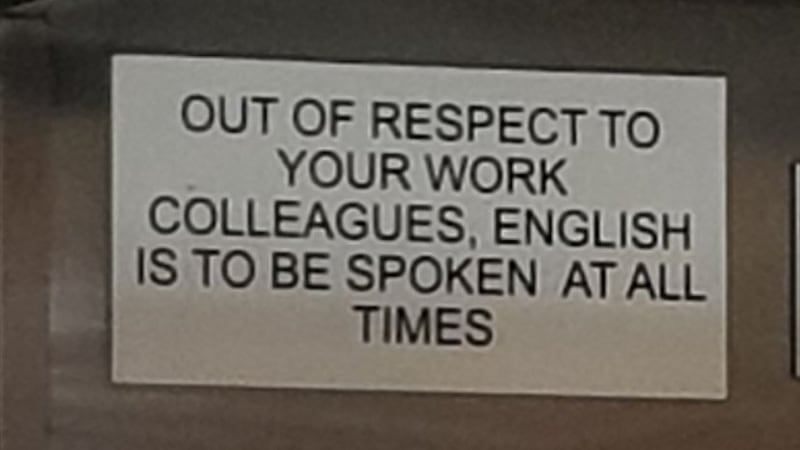Photo source - Twitter / @sidelinemaori
A café in Auckland has received criticism for putting up a sign in the workplace telling staff members to speak no other languages except English.
The sign at Circus Circus in Mt Eden says, “Out of respect for your colleagues, English is to be spoken at all times.”
A Twitter user named TK posted a photo of the sign to Twitter saying, "Mt Eden has quite a multicultural workforce so it's a shame to see this. Also quite uncomfortable to read from the table as a customer."
Associate Professor of Law at Auckland University of Technology Khylee Quince says it was a “bizarre thing to have on a sign”.
Quince says she made plans to meet friends at the café this morning but changed her mind after coming across the photo on Twitter.
“I saw that post just by chance on Twitter, and what I really wanted to know was, what was the purpose of it,” Quince says.
So instead of meeting her friends at Circus Circus, she decided to meet them at another café across the road.
Purpose of the signage
The manager at Circus Circus Nixon Shran told Te Ao the intention of the signage was to improve the communication between staff members, not to offend anyone and not to be racist.
“You can speak any language you want. But at work, when you’re talking to people at work from different countries and different backgrounds, English is the only language that everyone understands and we want everyone to communicate in that language,” Shran says.
Another staff member says there are many different nationalities of staff at the café, including Indian and Nepalese.
Shran says all staff members are happy to speak English amongst each other.
Speaking te reo Māori
Shran says staff members also enjoy teaching each other Māori greetings including “kia ora, tēnā koutou katoa and mōrena” to say to their customers.
“We have no problems greeting customers in Māori,” says Shran.
Quince says she has empathy for a business owner who wants to work as a team, “but you have to do so in a way that doesn’t offend people’s rights to speak their own language...I certainly wouldn’t have a sign like that in public but I don’t think there’s anything wrong necessarily with the manager saying ‘In order to do our jobs appropriately we should do this’.”
Quince says in New Zealand the Bill of Rights and Human Rights Act protects the right of citizens to practice their culture and speak their languages.
“If you’re in front of house, at least, you need a working knowledge of English to be effective at your job. But it’s a bit on the cusps in terms of whether it’s acceptable, she says.
“The Human Rights Commission is quite clear that you can’t force staff to speak English but there is almost a grey area between your right to speak your own language and the capabilities that are required to do a particular job.”
Shran says the café was forced close temporarily following the impact of COVID-19 but since reopening in Alert Level 3, many loyal customers have returned.
He hopes that any upset caused by the signage doesn’t cause further setbacks for the business and he says the signage has been removed, out of sight of customers.

